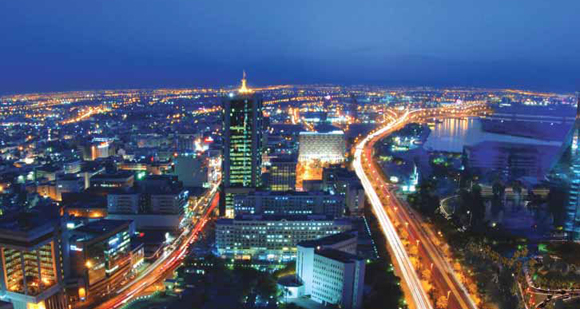Bahrain’s GDP: Bahrain to Diversify Its GDP
Bahrain Top Stories
Bahrain’s GDP: Bahrain to Diversify Its GDP
The big story out of Bahrain for the past forty years has been diversification of its GDP – the diversification from the oil. Since its independence, Bahrain has followed three policies to achieve diversification that have positioned it as the fastest growing economy in the Middle East.

Bahrain’s GDP: Bahrain to Diversify Its GDP
The big story out of Bahrain for the past forty years has been diversification of its GDP – the diversification from the oil.
The big story out of Bahrain for the past forty years has been diversification of its GDP – the diversification from the oil. Since its independence, Bahrain has followed three policies to achieve diversification that have positioned it as the fastest growing economy in the Middle East.
The first of these policies has been for the government to acquire major shares of its oil producing industries, and to use the income from that ownership for the purpose of developing other industries, so that the country would be less dependent on oil production. In addition to acquiring ownership, Bahrain has also taxed petroleum exports at a high rate, utilizing this income for the same purpose.
This has been remarkably successful. With this income, Bahrain has created several new manufacturing and processing industries—chief among them: oil refining, natural gas liquefaction, aluminum smelting, iron pelletizing, and fertilizer production—so that the industrial sector of the economy now accounts for more than 57% of GDP, and 79% of total employment. As a result, while basic petroleum production and refining accounts for more than 60% of export receipts and 70% of government revenues, its share of GDP now constitutes only 11% of total GDP.
The second policy has been to develop other sectors of the economy to create alternative sources of national income and employment. The chief achievement here has been in raising the financial sector of Bahrain to be the leading banking and financial center of the Middle East. The financial services sector now accounts for 27% of GDP. A free trade agreement with the United States in 2005—the first in the Gulf Region—has helped Bahrain to become a major trading center in the region, as well as to help develop its port facilities, shipping, airline, and logistics industries. Finally, Bahrain has made significant investments to develop its tourist, commercial, and real estate investment sectors.
The third policy has been to liberalize its business and social practices, so as to make Bahrain the freest and most open, and most tolerant society in the Middle East. On the business side, Bahrain is recognized as one the easiest countries in the world to start a new business, and one of the cheapest in which to do business. On the banking side, its central bank has introduced the best regulatory system in the Middle East, enabling its financial services sector to reach the level of 27% of Bahrain’s GDP, and for its Islamic banking services to rival Malaysia’s as the top Islamic banking center in the world. On the social side, its secular liberalization of laws has made Bahrain’s capital, Manama, one of the top tourist destinations for Arab and Western tourists in the Middle East seeking to “let their hair down.” Finally, its policy of religious tolerance has made it the most open and friendly society for all forms of religious worship, including Moslem, Christian, Jewish, Buddhist, Hindu (Bahrain has a large population of immigrants and expatriates from India and other Asia-Pacific nations), and other religions.
|
loading the player….
|
These three policies have produced startling successes. For example, Bahrain has consistently received the following kinds of rankings and praise:
-
“Most diversified economy in the Middle East” . . . and ”one of the most stable economies in the Gulf region”—World Economic Forum (WEF) and CIA Factbook
-
“Least oil-dependent economy in the Middle East”—Index of Economic Freedom 2011 (Heritage Foundation and Wall Street Journal)
-
“10th Freest Economy in the world”—Index of Economic Freedom 2011
-
“Highest level of economic freedom of all Arab Nations”—Fraser Institute 2011
-
“4th most favorable tax regime in the world”—WEF
-
” 28th best place to do business” (out of 183)—World Bank
-
“37th most competitive” (out of 139)—Global Competitiveness Index
-
2nd in the Gulf region for its travel and tourism competiveness”—WEF
-
“Most successful monetary authority in the Arab world”
-
“Region’s undisputed financial capital”
-
“ “Cheapest place in the GCC to do business”
-
“3rd best country for expatriates in the world”
-
Bahrain’s international airport “busiest in the Persian Gulf”